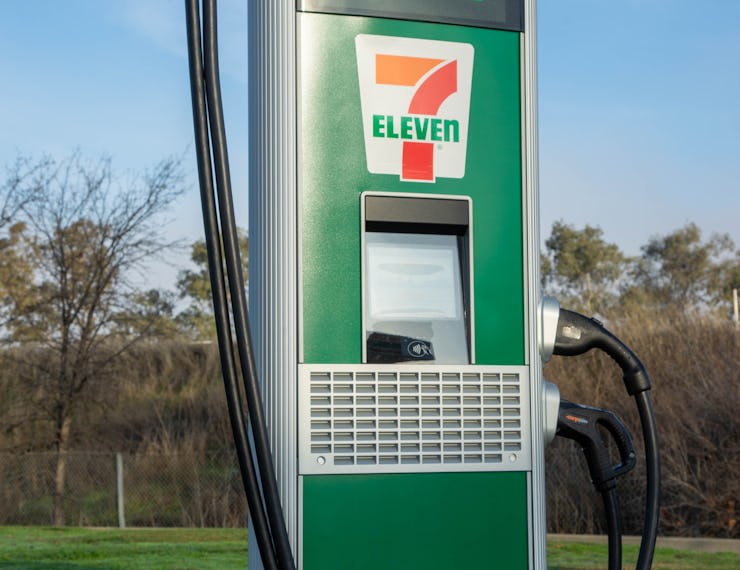250
new charging locations

EV charging just took a big step forward thanks to an unlikely retail chain
It will be one of the largest retailer-owned charging networks in the country. Here's how 7-Eleven (yes, the Slurpee chain) is helping to solve an EV problem.
by Jordan GolsonA store most famous for taquitos and the Slurpee might not be your first thought when it comes to forward-thinking retailers.
But 7-Eleven is working hard to be environmentally friendly, adopting aggressive sustainability goals and promising to support the electric car market with a new EV charger commitment.
7-Eleven is promising to install DC fast chargers at 250 stores in the U.S. and Canada by the end of 2022, allowing electric car users to juice up while they run in to grab a snack.
A 7-Eleven spokesperson told Inverse that electricity would be paid for by the minute or the kWh depending on the location, but it’s easy to imagine promotional tie-ups like getting a free five minutes of juice with every purchase of Bang energy drink or something.
The chargers appear to be rebranded ChargePoint units that will be owned and operated by the convenience store company.
EV’s big charging problem — The public charging industry is going through growing pains as consumers and carmakers work through a chicken-and-egg problem. The industry needs more chargers to support electric car buyers, while EV charging networks need more electric cars on the road to justify multi-billion dollar investments in infrastructure.
The best-known (and best, if we’re honest) charging network is the Supercharger from Tesla. Easy-to-use and ubiquitous across the country, the Supercharger is the number-one reason to buy a Tesla these days. The chargers are fast and dead-simple to use: pull up, plug in. There is no step three.
But the Supercharger was specifically built as a marketing play. The glowing red chargers are a shining beacon to all signaling that a Tesla Model S-X-3-whatever is the only EV to buy. But while Tesla’s expansive network is great news for the many hundreds of thousands of Tesla owners, it doesn’t help the rest of the industry.
A 7-Eleven “Evolution Store” in Manassas, Virginia with two quick-serve restaurants inside.
Theoretically, there’s a lot of competition in the public charging space. ChargePoint, EVgo, and Electrify America are all investing huge sums (especially that last one, which is funded by $2 billion Volkswagen had to cough up as part of the Dieselgate settlement) in charging networks with no clear indication of when they’ll get a return on their investment.
Fast chargers are really expensive, not just because of the chargers themselves, but because of real estate needs and especially the utility infrastructure needed to support the multi-megawatt charging needs of a large, multi-vehicle-capable station. Charging networks need to recoup their costs somehow, either through public subsidization or charging fees.
EV owners will be able to pick up a bacon, egg, cheese, and potato breakfast taquito while they charge up.
Taquitos and a recharge — Retailers can make a different play, which is why so many shopping malls (themselves an endangered species these days) are racing to install fast chargers to attract well-heeled EV-owners who will shop while their cars juice up. So what does 7-Eleven stand to gain?
7-Eleven doesn’t make its living off refueling cars. Many of its locations don’t sell gasoline at all, but the chain slings Slurpees and coffee and Bang energy drinks all day long. Installing chargers to entice customers isn’t a bad play, especially for a small pilot like this one. 500 charging ports seems like a lot, but 7-Eleven is only promising them at 250 stores across Canada and the US. (The company has close to 10,000 locations in North America alone.)
Energy companies, which franchise or own a huge share of the gas station market, are dipping their toes in the charging water as well. Shell owns the Greenlots charging network in the states. BP owns BP Pulse, the largest charging network in the UK. A number of other gas stations have signed deals to allow chargers to be installed on their properties.
7-Eleven CEO Joe DePinto said in a statement that installing the new EV charging stations “is good for our customers and our planet and it’s the right thing to do.” If it helps sell some Slurpees too that’s just a perk, right?
Subscribe to PRNDL, Jordan Golson’s car reviews newsletter, free on Substack.
This article was originally published on